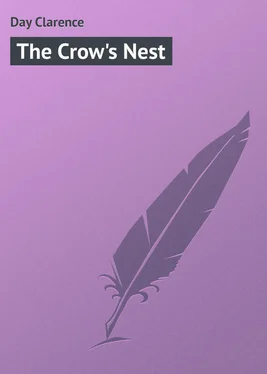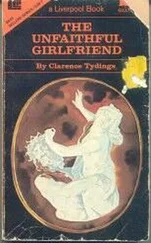Clarence Day - The Crow's Nest
Здесь есть возможность читать онлайн «Clarence Day - The Crow's Nest» — ознакомительный отрывок электронной книги совершенно бесплатно, а после прочтения отрывка купить полную версию. В некоторых случаях можно слушать аудио, скачать через торрент в формате fb2 и присутствует краткое содержание. Издательство: Иностранный паблик, Жанр: foreign_prose, на английском языке. Описание произведения, (предисловие) а так же отзывы посетителей доступны на портале библиотеки ЛибКат.
- Название:The Crow's Nest
- Автор:
- Издательство:Иностранный паблик
- Жанр:
- Год:неизвестен
- ISBN:нет данных
- Рейтинг книги:5 / 5. Голосов: 1
-
Избранное:Добавить в избранное
- Отзывы:
-
Ваша оценка:
- 100
- 1
- 2
- 3
- 4
- 5
The Crow's Nest: краткое содержание, описание и аннотация
Предлагаем к чтению аннотацию, описание, краткое содержание или предисловие (зависит от того, что написал сам автор книги «The Crow's Nest»). Если вы не нашли необходимую информацию о книге — напишите в комментариях, мы постараемся отыскать её.
The Crow's Nest — читать онлайн ознакомительный отрывок
Ниже представлен текст книги, разбитый по страницам. Система сохранения места последней прочитанной страницы, позволяет с удобством читать онлайн бесплатно книгу «The Crow's Nest», без необходимости каждый раз заново искать на чём Вы остановились. Поставьте закладку, и сможете в любой момент перейти на страницу, на которой закончили чтение.
Интервал:
Закладка:
On page two, I suddenly discover that beautiful women surround me. Are they adventuresses? I cannot tell. I must beware every minute. Everybody is wary and suave, and they are all princes and diplomats. The atmosphere is heavy with the clashing of powerful wills. Paid murderers and spies are about. Hah! am I being watched? The excitement soon gets to a point where it goes to my head. I find myself muttering thickly or biting my lips – two things I never do ordinarily and should not think of doing. I may even give a hoarse cry of rage as I sit in my armchair.
But I'm not in my armchair. I am on a terrace, alone, in the moonlight. A beautiful woman (a reliable one) comes swiftly toward me. Either she is enormously rich or else I am, but we don't think of that. We embrace each other. Hark! There is the duke, busily muttering thickly. How am I to reply to him? I decide to give him a hoarse cry of rage. He bites his lips at me. Some one else shoots us both. All is over.
If any one is too restless to take his vacation in books, the quaintest and queerest of countries is just around the corner. An immigrant is only allowed to stay from 8.15 to 11 P. M., but an hour in this country does more for you than a week in the mountains. No canned fish and vegetables, no babies —
I wonder, by the way, why most babies find existence so miserable? Convicts working on roadways, stout ladies in tight shoes and corsets, teachers of the French language – none of these suffering souls wail in public; they don't go around with puckered-up faces, distorted and screaming, and beating the air with clenched fists. Then why babies? You may say it's the nurse; but look at the patients in hospitals. They put up not only with illness, but nurses besides. No, babies are unreasonable; they expect far too much of existence. Each new generation that comes takes one look at the world, thinks wildly, "Is this all they've done to it?" and bursts into tears. "You might have got the place ready for us," they would say, only they can't speak the language. "What have you been doing all these thousands of years on this planet? It's messy, it's badly policed, badly laid out and built – "
Yes, Baby. It's dreadful. I don't know why we haven't done better. I said just now that you were unreasonable, but I take it all back. Statesmen complain if their servants fail to keep rooms and kitchens in order, but are statesmen themselves any good at getting the world tidied up? No, we none of us are. We all find it a wearisome business.
Let us go to that country I spoke of, the one round the corner. We stroll through its entrance, and we're in Theatrical-Land.
A remarkable country. May God bless the man who invented it. I always am struck by its ways, it's so odd and delightful —
"But," some one objects (it is possible), "it isn't real."
Ah, my dear sir, what world, then, is real, as a matter of fact? You won't deny that it's not only children who live in a world of their own, but débutantes, college boys, business men – certainly business men, so absorbed in their game that they lose sight of other realities. In fact, there is no one who doesn't lose sight of some, is there? Well, that's all that the average play does. It drops just a few out. To be sure, when it does that, it shows us an incomplete world, and hence not the real one; but that is characteristic of humans. We spend our lives moving from one incomplete world to another, from our homes to our clubs or our offices, laughing or grumbling, talking rapidly, reading the paper, and not doing much thinking outside of our grooves. Daily life is more comfortable, somehow, if you narrow your vision. When you try to take in all the realities, all the far-away high ones, you must first become quite still and lonely. And then in your loneliness a fire begins to creep through your veins. It's – well – I don't know much about it. Shall we return to the theater?
The oddest of all entertainments is a musical comedy. I remember that during the war we had one about Belgium. When the curtain went up, soldiers were talking by the light of a lantern, and clapping each other on the shoulder when their feelings grew deep. They exchanged many well-worded thoughts on their deep feelings, too, and they spoke these thoughts briskly and readily, for it was the eve of a battle. One of the soldiers blinked his eye now and then. He was taking it hard. He said briskly he probably would never see his mother again.
His comrade, being affected by this, clapped his friend on the shoulder, and said, Oh yes he would, and cheer up.
The other looked at him, stepped forward (with his chest well expanded), and said ringingly: "I was not thinking of myself, Jean. I was thinking of Bel-jum."
It was a trifle confusing, but we applauded him roundly for this. The light from the balcony shown full on the young hero's face. You could see he was ready for the enemy – his dark-rouged cheeks, his penciled eyebrows proved it. He offered to sing us a song, on the subject of home. His comrade hurried forward and clapped him some more on the shoulder.
The orchestra started.
" Muth-aw ,
" Muth-aw ," roared the hero, standing stiffly at attention,
" Let your arms en-fo-o-ho-old me. "
All was silent on the firing-line – except of course, for this singing. The enemy waited politely. The orchestra played on. Then the song ended, and promptly the banging of guns was heard in the distance – and a rather mild bang hit the shed and the lantern went out.
The audience was left there to shudder alone, in the darkness, not knowing whether the hero was dead – though, of course, we had hopes… Then up went the curtain, and there he stood by a château, where a plump Belgian maid, dressed in white silk, was pouring high tea.
An American war-correspondent appeared on the scene. He was the humorous character of the performance. He was always in trouble over his passports. He had with him a Red Cross nurse who capered about, singing songs, as did also eight Belgian girls, from the neighboring farms. Belgian girls are all young and tuneful, the audience learned, and they spend their time during wars dancing with war-correspondents. They wear fresh, pretty clothes. So do soldiers who come home on leave. Sky-blue uniforms, gilt, shiny boots. All was smiling in Bel-jum.
Then the clock struck eleven. The curtain went down, like a wall. We were turned out, like poor Cinderella, into the cold, noisy streets. Dense pushing crowds. Newsboys shouting, "Great Slaughter in Flanders." The wails of some baby attempting to get used to existence.
On Cows
I was thinking the other evening of cows. You say Why? I can't tell you. But it came to me, all of a sudden, that cows lead hard lives. It takes such a lot of grass, apparently, to keep a cow going that she has to spend all her time eating, day in and day out. Dogs bounce around and bark, horses caper, birds fly, also sing, while the cow looks on, enviously, maybe, unable to join them. Cows may long for conversation or prancing, for all that we know, but they can't spare the time. The problem of nourishment takes every hour: a pause might be fatal. So they go through life drearily eating, resentful and dumb. Their food is most uninteresting, and is frequently covered with bugs; and their thoughts, if they dwell on their hopeless careers, must be bitter.
In the old days, when huge and strange animals roamed through the world, there was an era when great size was necessary, as a protection. All creatures that could do so grew large. It was only thus they felt safe. But as soon as they became large, the grass-eating creatures began to have trouble, because of the fact that grass has a low nutritive value. You take a dinosaur, for instance, who was sixty or seventy feet long. Imagine what a hard task it must have been for him, every day, to get enough grass down his throat to supply his vast body. Do you wonder that, as scientists tell us, they died of exhaustion? Some starved to death even while feverishly chewing their cud – the remoter parts of their bodies fainting from famine while their fore-parts got fed.
Читать дальшеИнтервал:
Закладка:
Похожие книги на «The Crow's Nest»
Представляем Вашему вниманию похожие книги на «The Crow's Nest» списком для выбора. Мы отобрали схожую по названию и смыслу литературу в надежде предоставить читателям больше вариантов отыскать новые, интересные, ещё непрочитанные произведения.
Обсуждение, отзывы о книге «The Crow's Nest» и просто собственные мнения читателей. Оставьте ваши комментарии, напишите, что Вы думаете о произведении, его смысле или главных героях. Укажите что конкретно понравилось, а что нет, и почему Вы так считаете.












